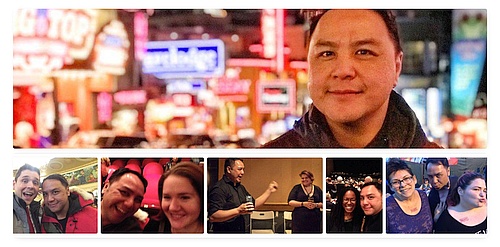
Paying tribute to Wayne Leung (1981-2019): passionate theatre advocate and MoT Managing Editor
I first met Wayne in 2011 when I interviewed him for the position of Assistant Editor at Mooney on Theatre. I remember sitting across from him with my Managing Editor at the time, Mira Saraf, and feeling like I was interviewing myself. It was an eerie feeling. His philosophies on theatre and business felt like a complete match for mine. Even the examples he used when answering questions often felt like word-for-word matches to ones I’d used in my own interviews for other positions.
Based on his application for the position, Mira and I expected his competency. What we didn’t know to expect was his dynamic energy, passion, and enthusiasm for Mooney on Theatre. As soon as he left, I turned to Mira and said: “I know we still have a few people to interview, but, he’s the one, right?” Mira nodded and confirmed what I was feeling with an “Oh yeah, for sure.”
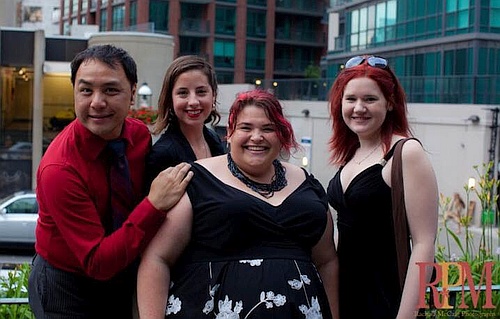
Within months, I had promoted him to the position of Editor. In 2012, when Mira had to step down from the role of Managing Editor because of competing commitments in a new day job, promoting Wayne again was a no-brainer.

It wasn’t just that Wayne was on-board with Mooney on Theatre’s core values of demystifying theatre, advocating for diversity in theatre and theatre writers and delivering reviews with kind, respectful critical feedback; they weren’t just something he promoted as part of his job – he embodied them, he championed them.
For a bit, there was a thing going around in some circles that Mooney on Theatre never gave a negative review – something that I think some artists would probably quickly disagree with. It was something that Wayne and I would often talk about. It ultimately proved useful when we trained new writers. We would emphasize that if you saw a show and didn’t like it, but didn’t tell the reader, not only would it be disrespectful to the reader by basically lying to them, but it would also make Mooney on Theatre irrelevant. What would be the point if we said we loved everything? Our approach was, simply be clear you were only speaking for yourself and use specific examples when providing critical feedback. And Wayne excelled at this.
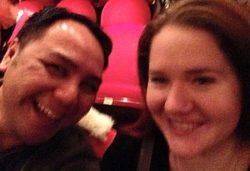
It was here we always pulled out one of our favourite stories. Wayne once reviewed a show produced by Sue Edworthy, a woman we work with extensively and enjoy and respect a great deal. Theatre is a small community, you will inevitably end up reviewing shows that people you really like are involved in. And so it was for Wayne with Sue’s show. The challenge was, he really didn’t like it.
I remember him asking for edits, feeling bad that he had to give a negative review – but that’s part of the job. We’ve all had to do it. The next day he saw Sue and was a bit terrified about the interaction to come. But instead of exchanging awkward pleasantries, Sue gave him a big hug and said: “that’s the best bad review I have ever gotten.”
And that was Wayne. Giving criticism in a clear, constructive way and highlighting what worked for him in the same clear, helpful way. And it wasn’t just with his writing. He did the same for writers. Helping them navigate tricky situations, whether it was critical feedback, or helping them call out things that felt racist, sexist, homophobic or otherwise problematic.
What a lot of people don’t realise about Wayne is that he had no formal training in theatre or journalism. In fact, his background was in Aerospace Engineering. Even though he hadn’t worked in it in a long time – he quickly discovered he was much more at home in communications – I always enjoyed the look on people’s faces when I told them that my Managing Editor was a literal Rocket Scientist. It was a testament to the breadth of Wayne’s abilities.
The fact that so many people assumed he had a background in theatre and weren’t aware of his diverse skills is echoed by the fact that from the outside he was seen as a writer, but in truth, he was so much more. He was fond of saying that it was as though I was the Board of Directors of MoT, and he was the CEO. It was an apt analogy.
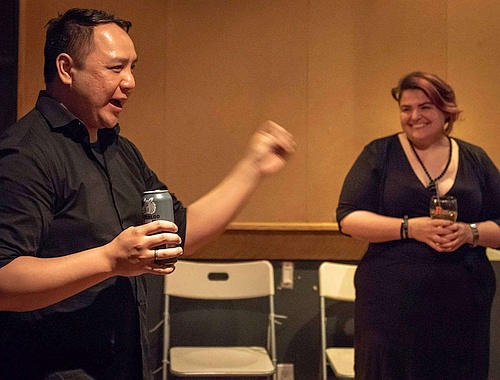
When it comes to MoT, I set the direction, set up systems, poke my head in occasionally and say “let’s do it this way now” (to which I always imagine a chorus of groans from the editorial team, but we work remotely, so I don’t hear them). But as life with kids started demanding more and more of my time, I stepped back more and more from day-to-day operations of MoT, except for Fringe. Wayne made it possible for that to happen and for MoT to continue as it has.
It was Wayne who kept those systems going. He took point on managing both the editorial team and the writers. He worked with me on HR issues and recruiting. He handled the editorial calendar, liaising with publicists, and, of course, wrote and edited. He did all this as a labour of love; we’re all volunteers here at Mooney on Theatre. And he did it all on top of a demanding job in digital communications at Doctors Without Borders/ Médecins Sans Frontières.
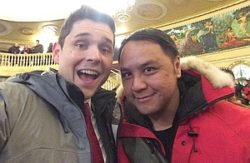
Wayne wasn’t just a colleague; he was also a friend. When I was talking to Glenn Sumi yesterday for his In Memoriam piece in NOW Magazine, I told him about the ease with which we switched back and forth between the two ‘roles.’ It would happen on a dime. It also resulted in some very long meetings, because we’d start on business, then suddenly there would be a couple hours of heavy personal talk, then, just like that, back to all business again. Long but lovely meetings.
What I didn’t really think about until later was how nothing that happened in our business relationship affected our friendship. Despite our compatibility business-wise we were, after all, still individual human beings. It would be a lot to expect us to never disagree during our eight years working together. But no matter how frustrated we might have been, we always stayed civil and professional with each other and knew that we always had each other’s back. But more importantly, no matter what happened at MoT, it never seemed to leak into our friendship.
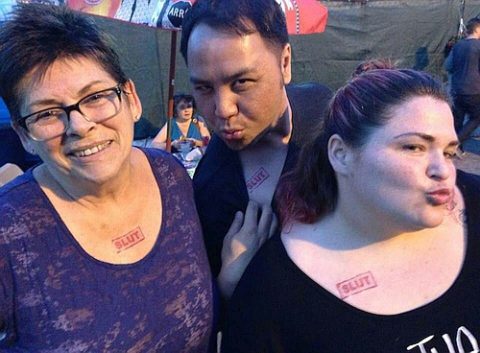
I will remember Wayne as dedicated, passionate, full of energy, smiling, laughing, caring, and above all, as a magnificent champion of Toronto theatre.
He will be missed by too many to list, and I am forever grateful to have had him in my life.
If you are interested in making a donation in Wayne’s name, a fund for donations to Rainbow Railroad.

I met Wayne – of all places – on a deliciously catty Cirque du Soleil fan forum that we were both on. Since we shared a passion for the form, a defining moment (and I am not exaggerating) of shaping who I was as a person was Wayne complimenting a critique I wrote. He praised the writing and encouraged me to be transparent, and taught me the same ethos of honesty and integrity when delivering a thoughtful, insightful critique of anything. I also learnt many new words, and how to write a LOT better – now working for circus arts organisations across Australia!! We actually never met in person, but stayed in touch and chatted over the years on and off. He will be missed.
I put this in the main article, but if anyone is interested in making a donation in Wayne’s name, a fund has been set up for donations to Rainbow Railroad in his memory. Here’s the link:
https://www.paypal.com/pools/c/8gxSKMtpDb?fbclid=IwAR2b5h6Cep2MxcfR9cgQfDQlwTULyP2u0EQCPPfQ_C4pb9TnCXnsn6RdOcs